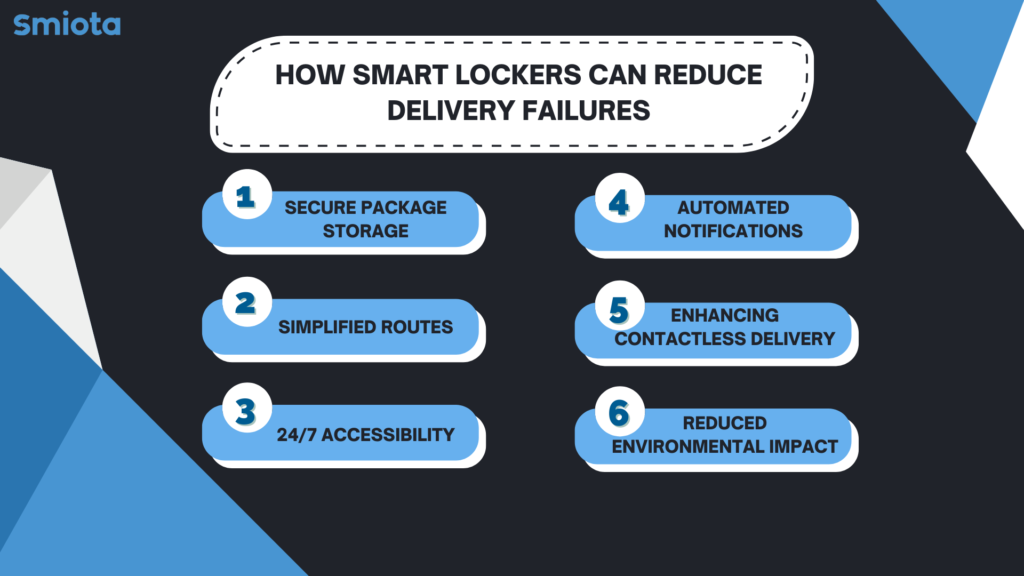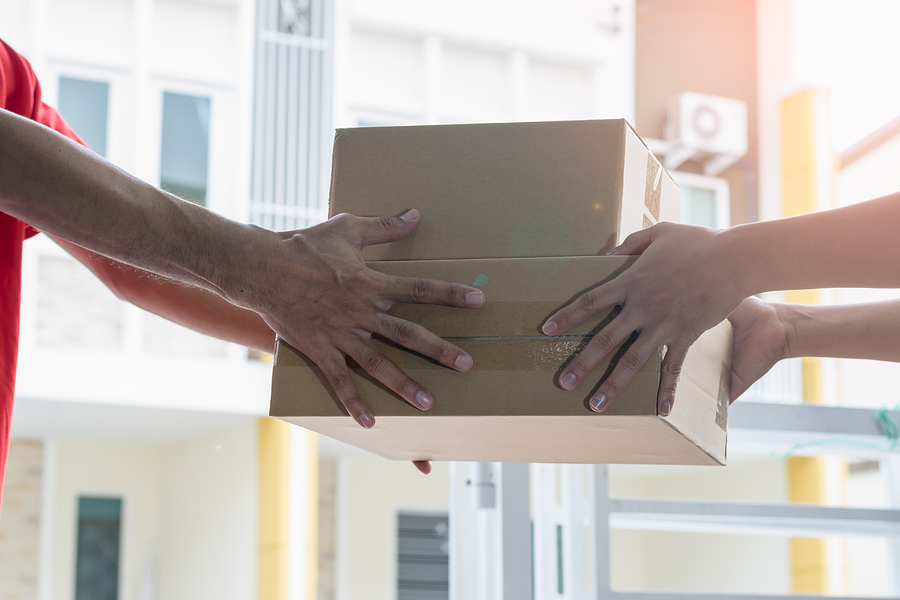The e-commerce industry has grown exponentially, making efficient delivery systems more crucial than ever. However, due to the complexities of the supply chain, we encounter a significant challenge that often determines the outcome of the entire process: last-mile delivery. This final step, which involves transporting goods from a distribution center to the end customer’s doorstep, is fraught with challenges.
For instance, customers’ absence at home can result in unsuccessful delivery attempts, causing dissatisfaction; the necessity for redelivery escalates expenses for businesses; and the potential for theft or damage to unattended packages introduces another layer of complexity and further exacerbates the issue. Such challenges underscore the importance of the last mile in the supply chain, making it a crucial element that decides the overall success of the logistic operations.
According to Gartner, smart parcel lockers help eliminate the challenges associated with package delivery during peak seasons like the holidays. These lockers offer security and convenience, circumventing many traditional challenges associated with last-mile delivery and addressing the rising demand for reliable and technology-enhanced parcel services. Before diving into the potential of smart storage lockers, let’s look at some of the reasons that cause delivery failures and their impact on supply chain operations.
Top Reasons for Supply Chain Delivery Failures
Supply chain delivery failures, especially in the last mile, are a critical concern for businesses across the globe. Understanding the top reasons behind these failures is the first step toward crafting effective solutions:
- Incorrect Address or Contact Information: Deliveries often fail when the provided address is incorrect, incomplete, or outdated. This simple error can lead to unsuccessful delivery attempts, increased costs, and delays.
- Last-Mile Logistics Challenges: The last mile of delivery is the supply chain’s most complex and cost-intensive part. Challenges such as traffic congestion, remote locations, and lack of infrastructure significantly impact delivery success rates.
- Customer Unavailability: A common reason for delivery failure is the recipient not being available to receive the package. This scenario necessitates redelivery attempts or returns, increasing operational costs.
- Weather and Unforeseen Events: Extreme weather conditions, natural disasters, or unforeseen events like strikes can disrupt delivery schedules, leading to delays or failures in meeting delivery commitments.
- Lack of Real-Time Communication: The absence of effective communication channels between delivery personnel and recipients often results in failed delivery attempts. Real-time updates and the ability to adjust delivery times or instructions can significantly improve success rates.
Impact of Last Mile Delivery Failure on the Overall Supply Chain Efficiency
The repercussions of final-mile delivery failures extend beyond the immediate inconvenience to customers and businesses and include the following:
- Increased Operational Costs: Each failed delivery attempt adds to the cost of logistics, from additional fuel consumption to labor costs. These expenses ultimately affect the bottom line of businesses.
- Reduced Customer Satisfaction: Frequent delivery failures lead to customer dissatisfaction and negatively impact brand reputation and customer loyalty. It results in loss of sales and decreased market competitiveness.
- Inefficiencies in Inventory Management: Failed deliveries contribute to inefficiencies in inventory management. Returned items occupy storage space and require additional handling, increasing operational complexities and costs.
- Environmental Impact: Unsuccessful delivery attempts contribute to increased carbon emissions due to repeated trips. This aspect is increasingly significant in global efforts to reduce carbon footprints.
- Resource Allocation Imbalance: Resources spent on addressing last-mile delivery failures could be more effectively utilized to optimize other parts of the supply chain, such as improving product quality or enhancing customer service.
Therefore, addressing last-mile delivery challenges is not just about solving a logistical problem; it’s about enhancing overall supply chain efficiency, reducing costs, and improving customer satisfaction.
It becomes clear that smart lockers represent a promising avenue for overcoming the obstacles of final-mile delivery, marking a significant step forward in the evolution of the supply chain.
How Smart Lockers Can Tackle and Reduce Delivery Failures
Smart lockers, like those provided by Smiota, offer a range of features that enhance the delivery and retrieval process for both couriers and recipients.
Secure Package Storage
One of the most significant benefits of smart lockers is their ability to store packages securely until recipients are ready to collect them. This directly addresses the problem of package theft, which is a growing concern in many urban and suburban areas. Smart lockers have advanced security features, including tamper-proof construction and electronic access control, ensuring that only the intended recipient can retrieve the package.
Simplified Routes
Smart lockers streamline the delivery process by consolidating multiple deliveries to a single location, reducing the number of stops delivery drivers need to make. This optimization of routes leads to more efficient deliveries, shorter delivery times, and, ultimately, lower costs for logistics companies.
24/7 Accessibility
Timing conflicts between delivery attempts and recipient availability are a significant cause of delivery failures. Smart lockers solve this issue by offering 24/7 accessibility, allowing recipients to pick up their packages at their convenience, whether after hours or on the weekend. This flexibility greatly reduces the chances of missed deliveries and eliminates the need for recipients to adjust their schedules to meet delivery times.
Automated Notifications
Upon package delivery to a smart locker, recipients are notified via email or a mobile app. This instant communication ensures that recipients are aware of their package’s arrival and can plan to retrieve it as soon as possible. Automating this process not only enhances the recipient’s experience but also reduces the workload on delivery personnel by eliminating the need for repeated delivery attempts.
Enhancing Contactless Delivery
Smart lockers have become essential in promoting contactless delivery, especially in the aftermath of Covid-19. By minimizing physical interactions between delivery personnel and recipients, smart lockers help prevent the spread of viruses while ensuring the safe and secure delivery of packages.
Reduced Environmental Impact
By centralizing deliveries to a single location, smart storage lockers also reduce the carbon footprint associated with last-mile delivery. Fewer failed delivery attempts mean fewer trips, leading to decreased fuel consumption and emissions. Moreover, the efficiency of smart locker systems can optimize delivery routes, further contributing to environmental sustainability.
Conclusion
Smart lockers answer last-mile delivery challenges, offering a win-win for both delivery services and recipients. By providing secure, accessible, and efficient package storage, they address the primary causes of delivery failures head-on. The features offered by Smiota’s smart lockers, from secure storage and 24/7 accessibility to automated notifications and environmental benefits, showcase the potential of technology to revolutionize the delivery landscape. As more businesses and consumers embrace innovative locker solutions, we can anticipate an overall improvement in the delivery experience. The adoption of smart lockers is more than a convenience; it’s a step towards a more secure, efficient, and environmentally responsible future in last-mile supply chain logistics.





